Next Tuesday and Wednesday, Xi Jinping will mark the tenth anniversary of his “project of the century,” the New Silk Road, with a summit in Beijing. In a pre-published white paper, Beijing praises the progress of the Belt and Road Initiative, as it is officially known. “Like seeds sown in a field,” the infrastructure measures in more than 150 countries are “gradually generating comprehensive benefits for the long term.” Beijing’s New Silk Road – a blessing for the world.
Ahead of the summit, Joern Petring has summarized why the BRI plans have actually long since ceased to be so beneficial. The Covid pandemic and the emerging crises in Ukraine and now also in the Middle East are setting back many BRI projects. On top of that, the debt burden of many countries has done immense damage to the reputation of the self-proclaimed “win-win project.” Another damper on BRI enthusiasm:
The number of heads of state and government attending the forum is significantly lower than at the last meeting in 2019. The most notable state guest in Beijing is, of all people, Russian President Vladimir Putin. This makes the decision to stay away from the forum all the easier for the Europeans.
Meanwhile, EU chief diplomat Josep Borrell is catching up on his long-planned trip to China. Until Saturday, he plans to hold talks with company representatives, scientists and politicians in Shanghai and Beijing. Given the impending trade conflicts between China and the EU, the need for talks is particularly high, writes Finn Mayer-Kuckuk.
In particular, the planned tariffs on EVs have the potential to trigger a backlash from China. As the EU’s foreign representative, Borrell also aims to show Beijing that Europe makes its own decisions. The assumption that Europe is merely a mere appendage of the US is still widespread in China.

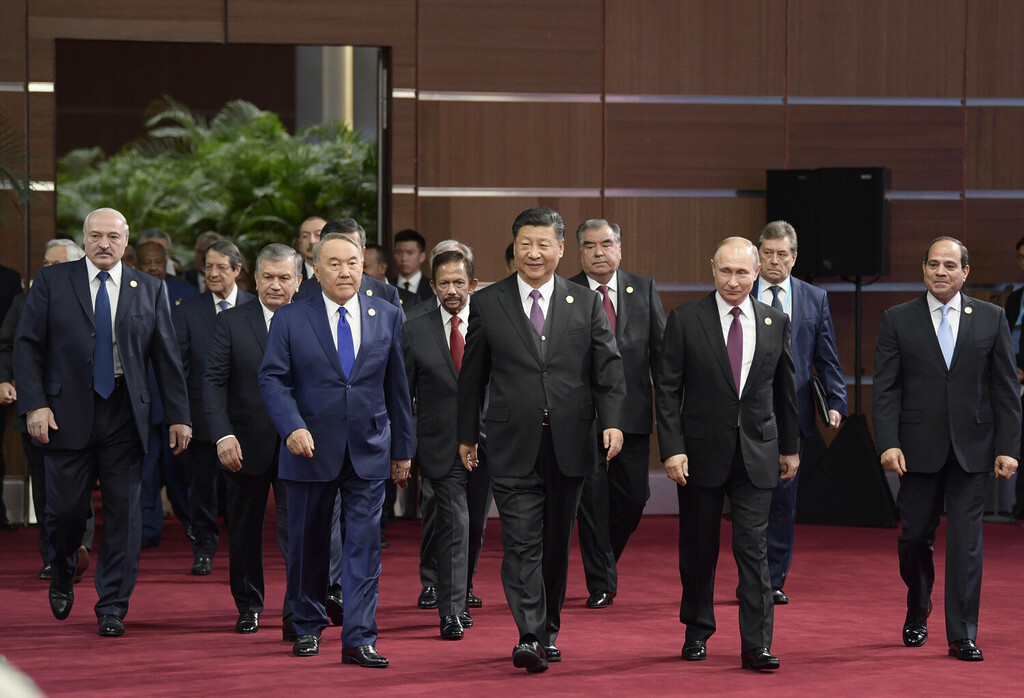
China plans to properly celebrate the tenth anniversary of its Belt and Road Initiative (BRI). This is why head of state and party leader Xi Jinping will host the Silk Road Summit in Beijing next Tuesday and Wednesday. It will be the third forum of this kind after 2017 and 2019.
Even before the state guests arrive, Beijing has heavily praised itself with a white paper. “A large number of infrastructure projects have been built, with significant progress for participating countries in the construction of railways, highways, pipelines, shipping, energy, communications and other basic public service facilities,” it says. Many projects are “like seeds sown in a field, gradually generating comprehensive benefits for the long term.”
Indeed, China’s “project of the century” can rightfully claim to have triggered a worldwide construction boom. More than 150 countries and 32 international organizations have joined the BRI. According to the Belt and Road Portal, China’s official website promoting the BRI, more than 200 agreements are currently in the works or have already been concluded, and nearly one trillion US dollars have been invested. Many of these funds have flowed primarily to developing countries in Africa, Central Asia and Southeast Asia.
Beijing also sees the BRI initiative as a project to make world trade fairer. It claims that many developing countries have benefited little from the economic globalization of the past decades and have lost their capacity for independent development as a result. “It is no longer acceptable that only a few countries dominate world economic development, control economic rules, and enjoy development fruits,” Beijing asserts with determination.
The white paper naturally omits the fact that the BRI itself has come under criticism. The initiative’s other problems are also left out. For instance, the disruptions caused by the Covid pandemic have set back many BRI projects. Member countries such as Sri Lanka and Pakistan struggle to repay borrowed money. Accusations that China is luring participating countries into a debt trap have fuelled skepticism about the initiative and damaged its reputation. And, of course, the Ukraine war and now the crisis in the Middle East are thwarting many BRI plans. Free goods transport through and along these regions is hardly feasible without political stability.
The world was different in 2013 when Xi Jinping launched the BRI. Geopolitical tensions were nowhere near as intense as they are today. European countries, in particular, seemed more open to Beijing’s plans. But that has also changed. Just recently, the BRI suffered another setback. Italy, the only G7 country to join in 2019, informed China of its intention to withdraw from the BRI.
The fact that the BRI is not only met with global support is now also apparent in the run-up to next week’s forum. While Xi Jinping welcomed 37 heads of state and government at the last BRI summit in 2019, the guest list seems to be shorter this time. Above all, the Europeans intend to avoid the summit. Four years ago, six EU states and Switzerland were still present. But this time, Beijing had to accept mostly cancellations, as the Wall Street Journal reported in the run-up.
Beijing apparently also tried to secure the attendance of Israeli President Benjamin Netanyahu. In June, he personally confirmed that he had been invited to a state visit. Israeli media reported at the time that the trip would probably be made in October – just in time for the BRI Forum. Given the current situation, this is out of the question. And after Beijing’s subdued reaction to the Hamas attack, a visit from Israel will probably not happen any time soon.
On the other hand, Russia’s President Vladimir Putin, who already confirmed his participation in the Forum in September, will be there. Serbian President Aleksandar Vučić already confirmed his invitation in July. As the South China Morning Post reported, heads of state from “strategic partners” from Southeast Asia and Africa are also expected, including Indonesia’s President Joko Widodo and Egypt’s President Abdel Fattah el-Sisi.
What already seems clear is that Beijing will tighten the Forum’s program. Unlike in 2019, the summit will only last two days instead of three. According to the South China Morning Post, the organizers have also reduced the number of panel discussions. Apparently, there will no longer be a round table of heads of state.
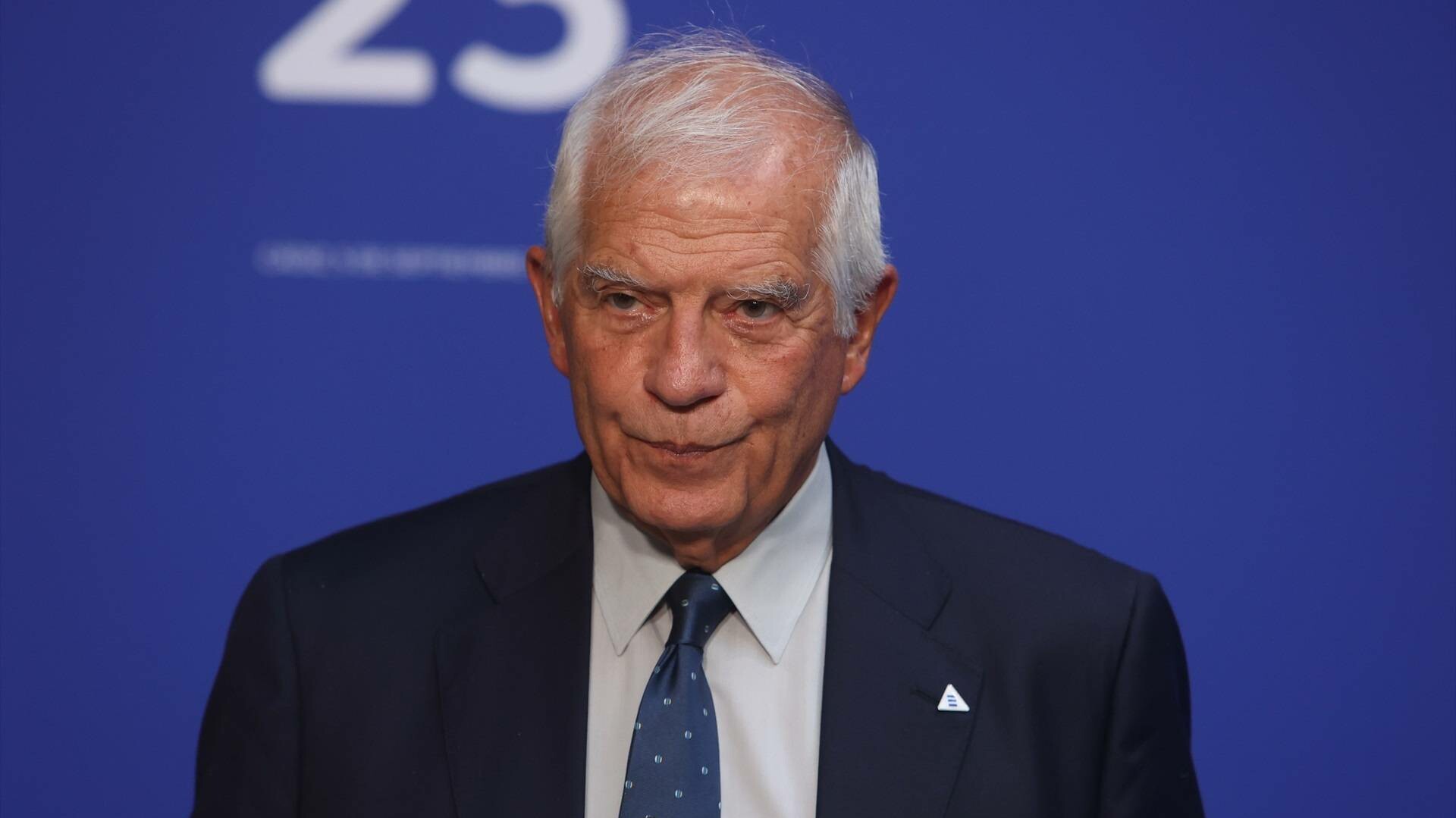
Josep Borrell, the EU’s High Representative of the European Union for Foreign Affairs, is in China until Saturday. He arrived in Shanghai on Thursday and immediately went on a series of appointments: He met with EU companies to hear their concerns and discussed with academics at the Shanghai Institute for International Studies. In the coming days, he has appointments in Beijing.
In view of the looming trade conflicts between China and the EU, the trip receives considerable attention. It was also eagerly anticipated: The trip was canceled in April due to illness and in July after Beijing canceled it. So, the mission was already off to a bad start.
The atmosphere between China and the EU is bad for several reasons. Commission President Ursula von der Leyen has taken the initiative to advance her de-risking strategy in several fields.
The planned tariffs have the potential to trigger a backlash from China. In the trade conflict with the US, China has not put up with any trade measure either and has responded with a roughly similar sanction each time.
In an interview with the South China Morning Post, Borrell laid out some positions he intends to raise in China.
In fact, “European independence” is a key phrase in China’s EU policy. It insinuates that Brussels and its member states are doing Washington’s bidding and have been antagonistic toward China in recent years. The implicit call for the EU to finally free itself from the US grip and turn “independently” back to China is also repeatedly brought up in high-level talks.
This view may be related to the fact that China is generally highly fixated on the United States as the dominant superpower it aspires to challenge. In this simplistic worldview, the EU, as a militarily insignificant player, joins either the US or China. The assumption in China that Europe is only an appendage of the US is so prevalent that it is hardly questioned.
Borrell now explicitly opposes this way of thinking. From the Commission’s perspective, Beijing vastly underestimates how much Europe thinks about the world – and how much resentment exists in Europe towards the US.
The EU’s foreign affairs representative is something like the foreign minister of the European Union. He is thus the chief diplomat of the EU Commission. At the same time, he is Vice-President of the Commission. Borrell comes from Spain and is a member of its Social Democrats.
Oct. 17, 2023; 8:30 a.m. CEST (2:30 p.m. CST)
CNBW, Working group “Sino-German Corporate Communications”: How can a global organization establish a robust and efficient internal communication framework? More
Oct. 17, 2023; 9:30 a.m. CST
Global Advanced Manufacturing Institute / KIT – Karlsruhe Institute of Technology, Event (in Suzhou): Opening of Remanufacturing Technology Innovation Center More
Oct. 19, 2023; 12 p.m. CEST (6 p.m. CST)
Dezan Shira & Associates / German Chamber of Commerce Hong Kong, Hybrid Seminar: Unveiling the Benefits and Realities of Applying for Offshore Status in Hong Kong More
Oct. 19, 2023; 6 p.m. CST
German Chamber of Commerce Shanghai, October Chamber Meeting (in Shanghai): China’s Auto Industry: The Race to a Sustainable Future More
Oct. 22-25, 2023; 1 p.m. CST
stars – for Leaders of the Next Generation, conference (in Shenzhen): stars China Symposium 2023 More
According to Reuters, Beijing could soon present the successor to ousted Defence Minister Li Shangfu. Li has been out of the public eye for weeks and has all likelihood been removed from office due to corruption allegations. His successor could be General Liu Zhenli.
The 59-year-old heads the Joint Staff Department of the Central Military Commission (JSDCMC), China’s highest decision-making body in defense. Among other things, the authority is responsible for planning combat operations. It was formed in January 2016 as part of Xi Jinping’s military reforms. Xi is chairman of the Central Military Commission (CMC) and armed forces commander-in-chief.
Reuters cites several anonymous sources, including a person directly familiar with the matter, two people close to the military and two regional officials. They claim the announcement could be made before an international security forum in Beijing at the end of October. rtr/fpe
China has launched a new round of corruption inspections to detect “potential major risks.” Li Xi, head of the Central Commission for Discipline Inspection (CCDI), declared this week that the country’s top anti-corruption agency would focus on five ministries and 26 state-owned enterprises in the upcoming investigations.
The list of agencies under investigation, released by the CCDI after a meeting on Tuesday, suggests that the focus will be on the technology sector. This is the second round of inspections since last October’s Communist Party National Congress. Li said the inspections were aimed at helping to defuse significant security risks. At a Politburo meeting last month, the leadership in Beijing said corruption inspections were an “effective means” to find problems and should be continued. Since Xi took office in 2012, sweeping anti-corruption campaigns have removed tens of thousands of officials from office, including Xi’s political rivals.
The latest crackdown, which lasted from March to September this year, targeted the financial, sports and medical sectors. More than 140 officials of state-owned enterprises were detained for investigation. At least 36 high-ranking cadres – officials from the rank of deputy minister – have been investigated this year. fpe
Hamas attacks on Israel have so far killed at least three Chinese nationals. This is reported by the news portal Caixin citing a report from the Foreign Ministry in Beijing.
In addition, two Chinese nationals are still missing and others are wounded, Foreign Ministry spokesman Wang Wenbin said. Chinese diplomatic missions are coordinating medical care for the injured Chinese and making arrangements for the deceased’s return. jul
Taiwan has set up a task force to draw lessons from Hamas’ surprise attack on Israel. Taiwan’s Defence Minister Chiu Kuo-cheng stated this in response to a reporter’s question in parliament on Thursday. “The initial (lesson) is that intelligence work is very important. With intelligence, many countermeasures can be made. A war can even be avoided,” Chiu said.
Although there are major differences between the Chinese threat against Taiwan and the events between Israel and Hamas – for instance, China would have to cross the Taiwan Strait to penetrate the island – the attack has once again drawn Taiwanese attention to a potential Chinese assault.
Taiwan’s government has condemned the Hamas attack, with President Tsai Ing-wen saying Taiwan remains “committed to working with like-minded countries to fight threats and violence and to safeguard freedom and democracy.” On Sunday, KMT chairman Eric Chu said what happened in Israel has “made everyone feel what it means to be threatened by war.” rtr
During talks in Beijing, Kadri Simson, Estonian EU Commissioner for Energy, urged China to commit to targets for expanding renewable energy and reducing methane. She met with Zhang Jianhua, Director of China’s National Energy Administration in Beijing. It was the first face-to-face EU-China energy talks since 2019.
Simson called on China to join a global methane reduction plan and commit to triple its renewable energy capacity by 2030. The talks also included commitments on CO2 neutrality, although Simson did not demand more ambitious efforts from China in this regard.
“I believe it will be possible to decarbonize way earlier than 2060 but every government has the right to choose their own path,” she told a press briefing, referring to China’s net zero target, which is a decade later than the EU’s 2050 goal.
The meeting takes place a few weeks before the UN Climate Change Conference COP28 in Dubai. The focus will be whether China and other major players, including the USA and the EU, can agree on key issues. rtr/jul

Hebei’s provincial capital, Shijiazhuang, is one of dozens of major cities in the People’s Republic that are home to more people than Europe’s largest metropolises yet are largely unknown outside China. As of the 2020 census date, the former heavy industrial center, 85 minutes from Beijing by high-speed train, counted a population of over 11.2 million. The city’s name even sounds bland to Chinese ears, to the point that bloggers took to online forums ranting that Shijiazhuang “should have changed its name long ago to stop seeming so backwoods” (早就该改名了,太土了).
The bloggers felt provoked by a decision of the city government, which decided on July 13 to declare Shijiazhuang China’s “home of rock’n’roll” (搖滾之城) and to market it as such on a large scale. The decision sparked ridicule on China’s Internet and amused head-shaking internationally. The name Shijiazhuang (石家庄) does not fit the claim of a rock city. Literally translated, the characters (石) stand for stone and (家) for family, but (莊) only for village.
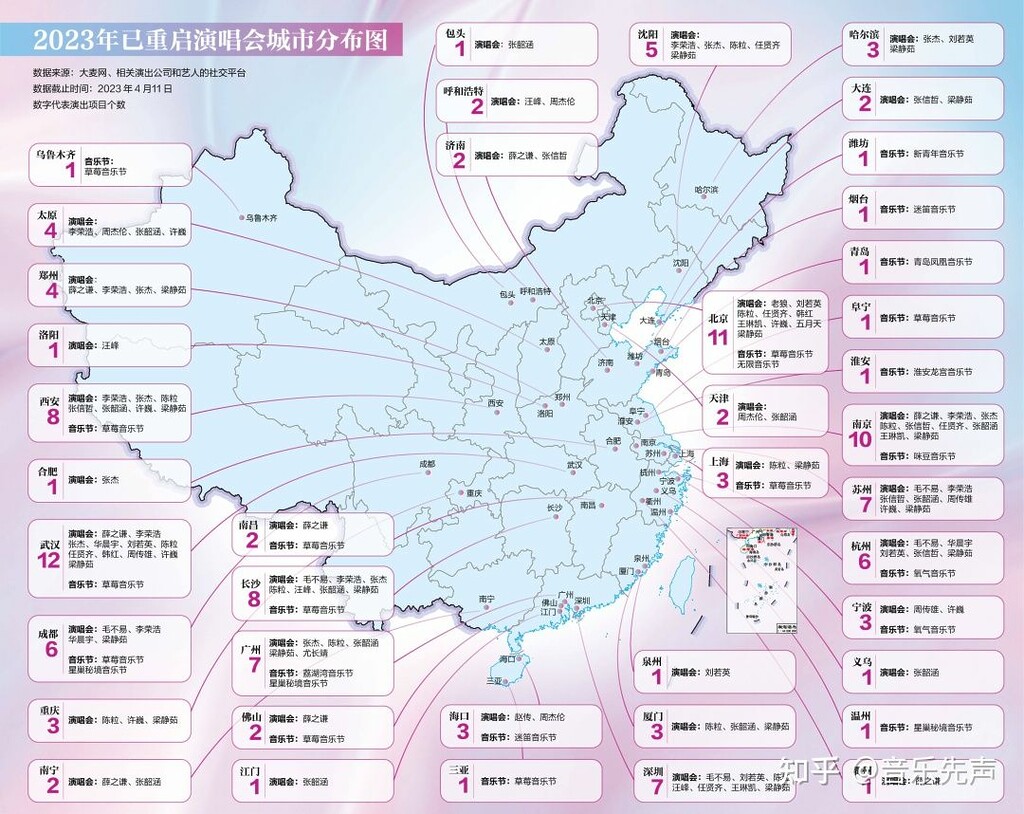
But the city now wants to show them all. For three months, until October, it celebrated its new role as China’s rock capital with dozens of music festivals. It converted its most modern shopping mall into a stage for hot music, and had rock bands perform in its subway and on buses (摇滚巴士摇滚地铁) seemingly spontaneously gigs with passengers.
On September 9, legendary Beijing rocker Cui Jian, now 62, also arrived for a guest performance. Once the musical voice of the cultural upheaval, he was banned from performing in 1990 when the Tiananmen students sang his iconic song: “Nothing to My Name” (一无所有) in 1989. However, he was later allowed to rock on again.
Moreover, officials pretend to carry on the city’s legacy, which allegedly embraced rock 30 years ago and made it popular nationwide. However, they forget that it was them who once attempted to suppress the underground and protest music coming from the West.
The city’s plan to land a market coup with rock tourism, draw in the youth and generate new demand amid a desolate economic situation, at least worked image-wise. Suddenly, Shijiazhuang was not only trending on China’s social media but also found mention in the international press. Hong Kong’s South China Morning Post, media in Japan or the United States were surprised that China seemingly did not enter a cultural ice age under ideologue Xi Jinping but rocked and rolled hard.
Admittedly, Western media did not always report on it like China’s propagandists had hoped. For example, in August, two Chinese columnists for the New York Times found that the CCP had been preparing to defuse the subversive nature of rock. For instance, it had a popular cult rock song rewritten by the Communist Youth League. They changed the title of the rock ballad “Kill The One from Shijiazhuang” (杀死那个石家庄人) to “The Unkillable One from Shijiazhuang” (杀不死的石家庄人). The song, written in 2010, once lamented the consequences of China’s modernization, the collapse of urban industries, the destruction of the environment and the frustration of Shijiazhuang’s youth. “Rock ‘n’ Roll According to the Chinese Communist Party” is what the New York Times called the song’s (near-total) rewrite, which was supposed to spark “positive energy” for the city’s socialist development. “One is bleak and despondent. The other, overflowing with optimism.” China’s social media sarcastically posted: The prevailing opinion is that “the new version is somehow even more depressing than the old one.”
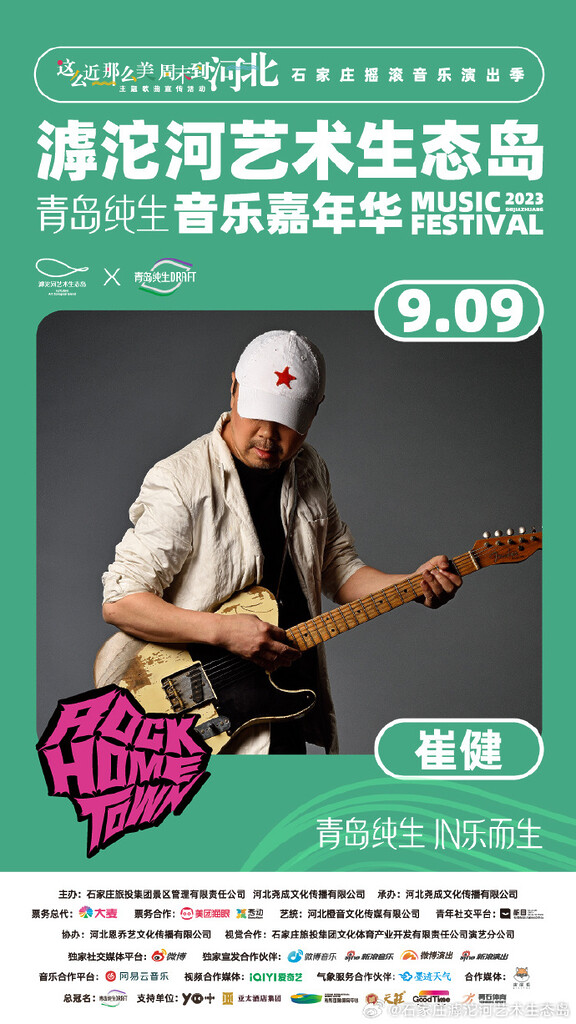
Other bloggers revealed that at the municipal conference that declared Shijiazhuang the home of rock in July, among the 21 participants were 15 party officials, but only six representatives of local rock bands. The website “Scream for Life,” dedicated to China’s punk and rock scene, subsequently named Shijiazhuang the first “state-approved hometown of rock.”
Beijing’s English propaganda media is beating the drum for a spontaneously rocking Shijiazhuang, true to Xi Jinping’s motto of breaking the West’s negative narrative and telling positive stories about China. Reporters from China Daily or Global Times praised, “Rock is coming back home.”
The only media to report more in-depth was the Beijing Review, which described the fierce competition between China’s cities and regions, which must use every means at their disposal to boost consumption. This is probably why Shijiazhuang came up with the idea of advertising itself as the city of rock. China is currently being flooded by a “wave of music festivals.” By the end of May alone, festivals raked in more than 1.2 billion yuan and drew more than 2.5 million visitors. The 每日经济新闻 newspaper also counted as many as 150 rock and pop music festivals nationwide in the first half of 2023 through July. An online map shows that large concerts have been held everywhere in China by April.
Shijiazhuang scores with its rock tradition. Of all publications, the party paper Global Times, infamous for its socialist indoctrination, praised two cult magazines published in the city in the 1990s. “They became guiding rock literature for the majority of China’s music fans.” Both played a “crucial role in popularizing rock music.”
What their praise fails to mention is that the magazines “Popular Music” (通俗歌曲) and “So Rock!” (我爱摇滚乐), which appeared from 1999 to 2013, each with a CD inside, and of which everyone is now so proud, were the country’s fiercest hard rock and satirical magazines despite resistance from the party authorities. In retrospect, this era seems to have been downright tolerant before Xi Jinping’s rise to power in 2013.
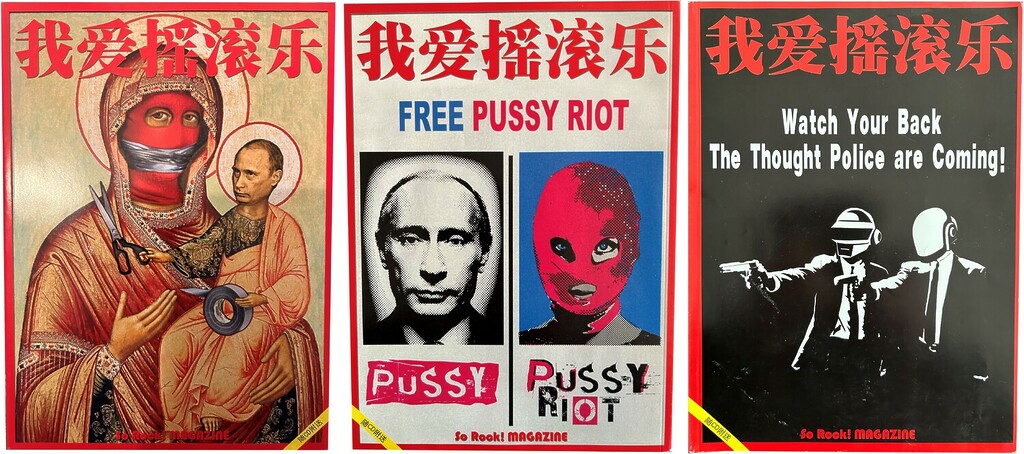
Together with Eva Corell from German public broadcaster ARD, I visited the eight young employees around then editor-in-chief Xiao Zhu in their apartment on the seventh floor of a residential building in Shijiazhuang in 2005. There, they produced their 80-page magazine every month on six computers and thanks to their access to the World Wide Web. “We are the desperadoes of the underground publishing industry,” Xiao Zhu said.
135 issues were published until they discontinued the magazine in 2013 before the authorities under the new party leader Xi could take them down. To this day, their professionally designed covers are so provocative that anyone who reprints them could be arrested. Time and again, the editorial team was harassed, fined, their computers confiscated, or the staff even detained for a few days. But they always started over and managed to distribute their magazines to newsstands in dozens of cities in China, where they were openly displayed. Their secret: They never printed over 10,000 copies, since the censors only routinely monitored magazines with print runs above that. They also did not have a license to publish a magazine. Instead, they obtained a trading permit for music CDs. They registered their magazine as an accompanying booklet for the CDs.
Their readers laughed when “So Rock!” drew a skirt or pants on the trademarked mascot for the 2008 Olympics – a stick figure stylized as a runner – and designated them as the new toilet signposts for Beijing, or when they published their satirical script for the pompous Olympic opening ceremony. Their “Absolute Truth” column featured reports about spectacular discoveries of early Stone Age cave inscriptions. Archaeologists had deciphered weathered words mentioning the Communist Party – the long-sought proof that the CCP has existed for at least 270 million years.
China’s hyped rock music renaissance, even if it is only meant as a coup to stimulate the market, comes across against the current political background as a desperate decentralized search for new freedoms.
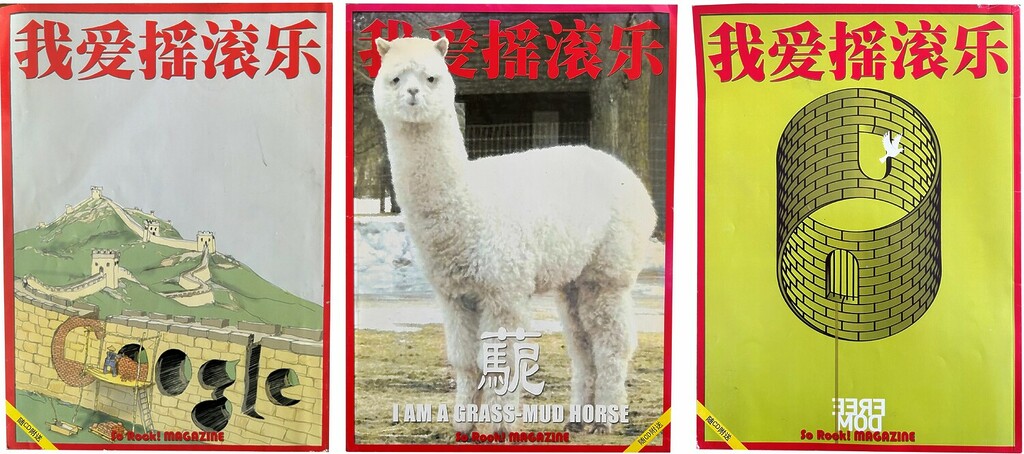
Beijing is not willing to grant them. On October 7 and 8, Xi Jinping convened a “National Conference,” which meets every five years, to determine how communication, culture and ideology can be more closely monitored. The first conference on this subject was in 2013. Now, “for the first time, Xi Jinping’s thoughts on culture” (习近平文化思想) have been completed, the party press said. It quoted Xi as saying: Despite the current economic problems, control and supervision are absolute priorities. “While focusing on economic development, we must not neglect or weaken ideological work for one moment…otherwise we will make an irreversible, historic mistake,” (“在集中精力进行经济建设的同时,一刻也不能放松和削弱意识形态工作…,否则就要犯无可挽回的历史性错误”).
Times are getting even harder, even for rocks that just want to roll.
On Wednesday, China’s State Council announced the appointment of several officials:
Qian Yi was appointed deputy head of the National Food and Strategic Reserves Administration. Shen Zhulin was named deputy head of the National Data Administration. Lu Jie was appointed deputy head of the State Tobacco Monopoly Administration. Ma Bing was appointed deputy head of the Civil Aviation Administration of China.
Is something changing in your organization? Let us know at heads@table.media!
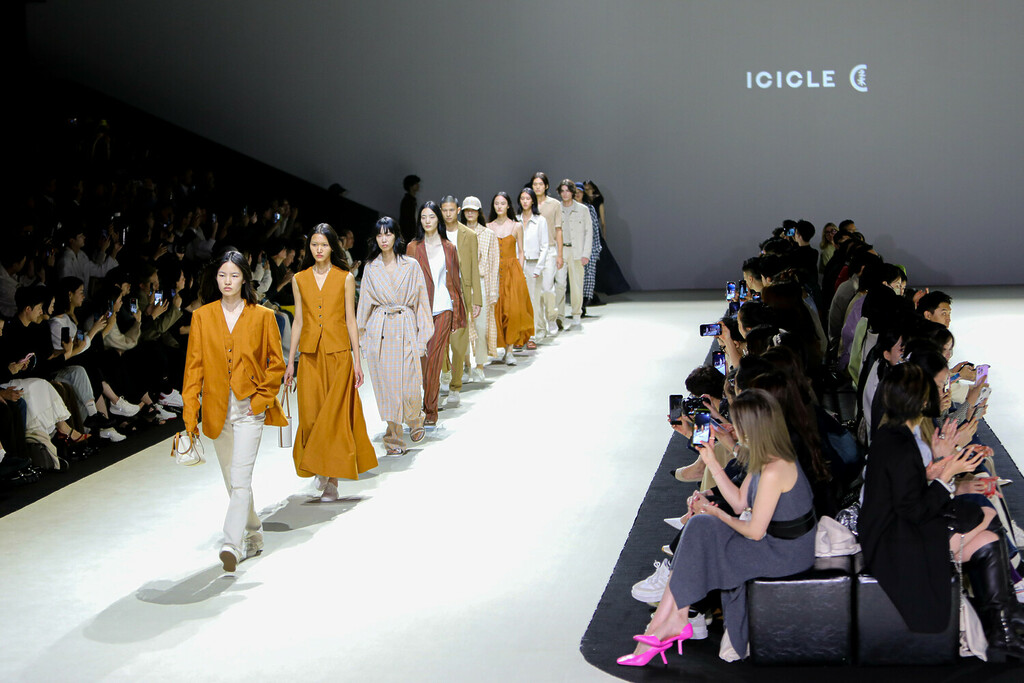
Until 16 October, the world’s most famous fashion designers will present their collections for the upcoming 2024 spring and summer season at Shanghai Fashion Week. The fashion event, which is known far beyond China’s borders, focuses especially on Chinese brands this year and also sent well-known first-generation Chinese supermodels back to the catwalk, including Qu Ying, Ma Yanli and Tong Chenjie. The opening show featured Shanghai newcomer Icicle.
Next Tuesday and Wednesday, Xi Jinping will mark the tenth anniversary of his “project of the century,” the New Silk Road, with a summit in Beijing. In a pre-published white paper, Beijing praises the progress of the Belt and Road Initiative, as it is officially known. “Like seeds sown in a field,” the infrastructure measures in more than 150 countries are “gradually generating comprehensive benefits for the long term.” Beijing’s New Silk Road – a blessing for the world.
Ahead of the summit, Joern Petring has summarized why the BRI plans have actually long since ceased to be so beneficial. The Covid pandemic and the emerging crises in Ukraine and now also in the Middle East are setting back many BRI projects. On top of that, the debt burden of many countries has done immense damage to the reputation of the self-proclaimed “win-win project.” Another damper on BRI enthusiasm:
The number of heads of state and government attending the forum is significantly lower than at the last meeting in 2019. The most notable state guest in Beijing is, of all people, Russian President Vladimir Putin. This makes the decision to stay away from the forum all the easier for the Europeans.
Meanwhile, EU chief diplomat Josep Borrell is catching up on his long-planned trip to China. Until Saturday, he plans to hold talks with company representatives, scientists and politicians in Shanghai and Beijing. Given the impending trade conflicts between China and the EU, the need for talks is particularly high, writes Finn Mayer-Kuckuk.
In particular, the planned tariffs on EVs have the potential to trigger a backlash from China. As the EU’s foreign representative, Borrell also aims to show Beijing that Europe makes its own decisions. The assumption that Europe is merely a mere appendage of the US is still widespread in China.


China plans to properly celebrate the tenth anniversary of its Belt and Road Initiative (BRI). This is why head of state and party leader Xi Jinping will host the Silk Road Summit in Beijing next Tuesday and Wednesday. It will be the third forum of this kind after 2017 and 2019.
Even before the state guests arrive, Beijing has heavily praised itself with a white paper. “A large number of infrastructure projects have been built, with significant progress for participating countries in the construction of railways, highways, pipelines, shipping, energy, communications and other basic public service facilities,” it says. Many projects are “like seeds sown in a field, gradually generating comprehensive benefits for the long term.”
Indeed, China’s “project of the century” can rightfully claim to have triggered a worldwide construction boom. More than 150 countries and 32 international organizations have joined the BRI. According to the Belt and Road Portal, China’s official website promoting the BRI, more than 200 agreements are currently in the works or have already been concluded, and nearly one trillion US dollars have been invested. Many of these funds have flowed primarily to developing countries in Africa, Central Asia and Southeast Asia.
Beijing also sees the BRI initiative as a project to make world trade fairer. It claims that many developing countries have benefited little from the economic globalization of the past decades and have lost their capacity for independent development as a result. “It is no longer acceptable that only a few countries dominate world economic development, control economic rules, and enjoy development fruits,” Beijing asserts with determination.
The white paper naturally omits the fact that the BRI itself has come under criticism. The initiative’s other problems are also left out. For instance, the disruptions caused by the Covid pandemic have set back many BRI projects. Member countries such as Sri Lanka and Pakistan struggle to repay borrowed money. Accusations that China is luring participating countries into a debt trap have fuelled skepticism about the initiative and damaged its reputation. And, of course, the Ukraine war and now the crisis in the Middle East are thwarting many BRI plans. Free goods transport through and along these regions is hardly feasible without political stability.
The world was different in 2013 when Xi Jinping launched the BRI. Geopolitical tensions were nowhere near as intense as they are today. European countries, in particular, seemed more open to Beijing’s plans. But that has also changed. Just recently, the BRI suffered another setback. Italy, the only G7 country to join in 2019, informed China of its intention to withdraw from the BRI.
The fact that the BRI is not only met with global support is now also apparent in the run-up to next week’s forum. While Xi Jinping welcomed 37 heads of state and government at the last BRI summit in 2019, the guest list seems to be shorter this time. Above all, the Europeans intend to avoid the summit. Four years ago, six EU states and Switzerland were still present. But this time, Beijing had to accept mostly cancellations, as the Wall Street Journal reported in the run-up.
Beijing apparently also tried to secure the attendance of Israeli President Benjamin Netanyahu. In June, he personally confirmed that he had been invited to a state visit. Israeli media reported at the time that the trip would probably be made in October – just in time for the BRI Forum. Given the current situation, this is out of the question. And after Beijing’s subdued reaction to the Hamas attack, a visit from Israel will probably not happen any time soon.
On the other hand, Russia’s President Vladimir Putin, who already confirmed his participation in the Forum in September, will be there. Serbian President Aleksandar Vučić already confirmed his invitation in July. As the South China Morning Post reported, heads of state from “strategic partners” from Southeast Asia and Africa are also expected, including Indonesia’s President Joko Widodo and Egypt’s President Abdel Fattah el-Sisi.
What already seems clear is that Beijing will tighten the Forum’s program. Unlike in 2019, the summit will only last two days instead of three. According to the South China Morning Post, the organizers have also reduced the number of panel discussions. Apparently, there will no longer be a round table of heads of state.

Josep Borrell, the EU’s High Representative of the European Union for Foreign Affairs, is in China until Saturday. He arrived in Shanghai on Thursday and immediately went on a series of appointments: He met with EU companies to hear their concerns and discussed with academics at the Shanghai Institute for International Studies. In the coming days, he has appointments in Beijing.
In view of the looming trade conflicts between China and the EU, the trip receives considerable attention. It was also eagerly anticipated: The trip was canceled in April due to illness and in July after Beijing canceled it. So, the mission was already off to a bad start.
The atmosphere between China and the EU is bad for several reasons. Commission President Ursula von der Leyen has taken the initiative to advance her de-risking strategy in several fields.
The planned tariffs have the potential to trigger a backlash from China. In the trade conflict with the US, China has not put up with any trade measure either and has responded with a roughly similar sanction each time.
In an interview with the South China Morning Post, Borrell laid out some positions he intends to raise in China.
In fact, “European independence” is a key phrase in China’s EU policy. It insinuates that Brussels and its member states are doing Washington’s bidding and have been antagonistic toward China in recent years. The implicit call for the EU to finally free itself from the US grip and turn “independently” back to China is also repeatedly brought up in high-level talks.
This view may be related to the fact that China is generally highly fixated on the United States as the dominant superpower it aspires to challenge. In this simplistic worldview, the EU, as a militarily insignificant player, joins either the US or China. The assumption in China that Europe is only an appendage of the US is so prevalent that it is hardly questioned.
Borrell now explicitly opposes this way of thinking. From the Commission’s perspective, Beijing vastly underestimates how much Europe thinks about the world – and how much resentment exists in Europe towards the US.
The EU’s foreign affairs representative is something like the foreign minister of the European Union. He is thus the chief diplomat of the EU Commission. At the same time, he is Vice-President of the Commission. Borrell comes from Spain and is a member of its Social Democrats.
Oct. 17, 2023; 8:30 a.m. CEST (2:30 p.m. CST)
CNBW, Working group “Sino-German Corporate Communications”: How can a global organization establish a robust and efficient internal communication framework? More
Oct. 17, 2023; 9:30 a.m. CST
Global Advanced Manufacturing Institute / KIT – Karlsruhe Institute of Technology, Event (in Suzhou): Opening of Remanufacturing Technology Innovation Center More
Oct. 19, 2023; 12 p.m. CEST (6 p.m. CST)
Dezan Shira & Associates / German Chamber of Commerce Hong Kong, Hybrid Seminar: Unveiling the Benefits and Realities of Applying for Offshore Status in Hong Kong More
Oct. 19, 2023; 6 p.m. CST
German Chamber of Commerce Shanghai, October Chamber Meeting (in Shanghai): China’s Auto Industry: The Race to a Sustainable Future More
Oct. 22-25, 2023; 1 p.m. CST
stars – for Leaders of the Next Generation, conference (in Shenzhen): stars China Symposium 2023 More
According to Reuters, Beijing could soon present the successor to ousted Defence Minister Li Shangfu. Li has been out of the public eye for weeks and has all likelihood been removed from office due to corruption allegations. His successor could be General Liu Zhenli.
The 59-year-old heads the Joint Staff Department of the Central Military Commission (JSDCMC), China’s highest decision-making body in defense. Among other things, the authority is responsible for planning combat operations. It was formed in January 2016 as part of Xi Jinping’s military reforms. Xi is chairman of the Central Military Commission (CMC) and armed forces commander-in-chief.
Reuters cites several anonymous sources, including a person directly familiar with the matter, two people close to the military and two regional officials. They claim the announcement could be made before an international security forum in Beijing at the end of October. rtr/fpe
China has launched a new round of corruption inspections to detect “potential major risks.” Li Xi, head of the Central Commission for Discipline Inspection (CCDI), declared this week that the country’s top anti-corruption agency would focus on five ministries and 26 state-owned enterprises in the upcoming investigations.
The list of agencies under investigation, released by the CCDI after a meeting on Tuesday, suggests that the focus will be on the technology sector. This is the second round of inspections since last October’s Communist Party National Congress. Li said the inspections were aimed at helping to defuse significant security risks. At a Politburo meeting last month, the leadership in Beijing said corruption inspections were an “effective means” to find problems and should be continued. Since Xi took office in 2012, sweeping anti-corruption campaigns have removed tens of thousands of officials from office, including Xi’s political rivals.
The latest crackdown, which lasted from March to September this year, targeted the financial, sports and medical sectors. More than 140 officials of state-owned enterprises were detained for investigation. At least 36 high-ranking cadres – officials from the rank of deputy minister – have been investigated this year. fpe
Hamas attacks on Israel have so far killed at least three Chinese nationals. This is reported by the news portal Caixin citing a report from the Foreign Ministry in Beijing.
In addition, two Chinese nationals are still missing and others are wounded, Foreign Ministry spokesman Wang Wenbin said. Chinese diplomatic missions are coordinating medical care for the injured Chinese and making arrangements for the deceased’s return. jul
Taiwan has set up a task force to draw lessons from Hamas’ surprise attack on Israel. Taiwan’s Defence Minister Chiu Kuo-cheng stated this in response to a reporter’s question in parliament on Thursday. “The initial (lesson) is that intelligence work is very important. With intelligence, many countermeasures can be made. A war can even be avoided,” Chiu said.
Although there are major differences between the Chinese threat against Taiwan and the events between Israel and Hamas – for instance, China would have to cross the Taiwan Strait to penetrate the island – the attack has once again drawn Taiwanese attention to a potential Chinese assault.
Taiwan’s government has condemned the Hamas attack, with President Tsai Ing-wen saying Taiwan remains “committed to working with like-minded countries to fight threats and violence and to safeguard freedom and democracy.” On Sunday, KMT chairman Eric Chu said what happened in Israel has “made everyone feel what it means to be threatened by war.” rtr
During talks in Beijing, Kadri Simson, Estonian EU Commissioner for Energy, urged China to commit to targets for expanding renewable energy and reducing methane. She met with Zhang Jianhua, Director of China’s National Energy Administration in Beijing. It was the first face-to-face EU-China energy talks since 2019.
Simson called on China to join a global methane reduction plan and commit to triple its renewable energy capacity by 2030. The talks also included commitments on CO2 neutrality, although Simson did not demand more ambitious efforts from China in this regard.
“I believe it will be possible to decarbonize way earlier than 2060 but every government has the right to choose their own path,” she told a press briefing, referring to China’s net zero target, which is a decade later than the EU’s 2050 goal.
The meeting takes place a few weeks before the UN Climate Change Conference COP28 in Dubai. The focus will be whether China and other major players, including the USA and the EU, can agree on key issues. rtr/jul

Hebei’s provincial capital, Shijiazhuang, is one of dozens of major cities in the People’s Republic that are home to more people than Europe’s largest metropolises yet are largely unknown outside China. As of the 2020 census date, the former heavy industrial center, 85 minutes from Beijing by high-speed train, counted a population of over 11.2 million. The city’s name even sounds bland to Chinese ears, to the point that bloggers took to online forums ranting that Shijiazhuang “should have changed its name long ago to stop seeming so backwoods” (早就该改名了,太土了).
The bloggers felt provoked by a decision of the city government, which decided on July 13 to declare Shijiazhuang China’s “home of rock’n’roll” (搖滾之城) and to market it as such on a large scale. The decision sparked ridicule on China’s Internet and amused head-shaking internationally. The name Shijiazhuang (石家庄) does not fit the claim of a rock city. Literally translated, the characters (石) stand for stone and (家) for family, but (莊) only for village.

But the city now wants to show them all. For three months, until October, it celebrated its new role as China’s rock capital with dozens of music festivals. It converted its most modern shopping mall into a stage for hot music, and had rock bands perform in its subway and on buses (摇滚巴士摇滚地铁) seemingly spontaneously gigs with passengers.
On September 9, legendary Beijing rocker Cui Jian, now 62, also arrived for a guest performance. Once the musical voice of the cultural upheaval, he was banned from performing in 1990 when the Tiananmen students sang his iconic song: “Nothing to My Name” (一无所有) in 1989. However, he was later allowed to rock on again.
Moreover, officials pretend to carry on the city’s legacy, which allegedly embraced rock 30 years ago and made it popular nationwide. However, they forget that it was them who once attempted to suppress the underground and protest music coming from the West.
The city’s plan to land a market coup with rock tourism, draw in the youth and generate new demand amid a desolate economic situation, at least worked image-wise. Suddenly, Shijiazhuang was not only trending on China’s social media but also found mention in the international press. Hong Kong’s South China Morning Post, media in Japan or the United States were surprised that China seemingly did not enter a cultural ice age under ideologue Xi Jinping but rocked and rolled hard.
Admittedly, Western media did not always report on it like China’s propagandists had hoped. For example, in August, two Chinese columnists for the New York Times found that the CCP had been preparing to defuse the subversive nature of rock. For instance, it had a popular cult rock song rewritten by the Communist Youth League. They changed the title of the rock ballad “Kill The One from Shijiazhuang” (杀死那个石家庄人) to “The Unkillable One from Shijiazhuang” (杀不死的石家庄人). The song, written in 2010, once lamented the consequences of China’s modernization, the collapse of urban industries, the destruction of the environment and the frustration of Shijiazhuang’s youth. “Rock ‘n’ Roll According to the Chinese Communist Party” is what the New York Times called the song’s (near-total) rewrite, which was supposed to spark “positive energy” for the city’s socialist development. “One is bleak and despondent. The other, overflowing with optimism.” China’s social media sarcastically posted: The prevailing opinion is that “the new version is somehow even more depressing than the old one.”

Other bloggers revealed that at the municipal conference that declared Shijiazhuang the home of rock in July, among the 21 participants were 15 party officials, but only six representatives of local rock bands. The website “Scream for Life,” dedicated to China’s punk and rock scene, subsequently named Shijiazhuang the first “state-approved hometown of rock.”
Beijing’s English propaganda media is beating the drum for a spontaneously rocking Shijiazhuang, true to Xi Jinping’s motto of breaking the West’s negative narrative and telling positive stories about China. Reporters from China Daily or Global Times praised, “Rock is coming back home.”
The only media to report more in-depth was the Beijing Review, which described the fierce competition between China’s cities and regions, which must use every means at their disposal to boost consumption. This is probably why Shijiazhuang came up with the idea of advertising itself as the city of rock. China is currently being flooded by a “wave of music festivals.” By the end of May alone, festivals raked in more than 1.2 billion yuan and drew more than 2.5 million visitors. The 每日经济新闻 newspaper also counted as many as 150 rock and pop music festivals nationwide in the first half of 2023 through July. An online map shows that large concerts have been held everywhere in China by April.
Shijiazhuang scores with its rock tradition. Of all publications, the party paper Global Times, infamous for its socialist indoctrination, praised two cult magazines published in the city in the 1990s. “They became guiding rock literature for the majority of China’s music fans.” Both played a “crucial role in popularizing rock music.”
What their praise fails to mention is that the magazines “Popular Music” (通俗歌曲) and “So Rock!” (我爱摇滚乐), which appeared from 1999 to 2013, each with a CD inside, and of which everyone is now so proud, were the country’s fiercest hard rock and satirical magazines despite resistance from the party authorities. In retrospect, this era seems to have been downright tolerant before Xi Jinping’s rise to power in 2013.

Together with Eva Corell from German public broadcaster ARD, I visited the eight young employees around then editor-in-chief Xiao Zhu in their apartment on the seventh floor of a residential building in Shijiazhuang in 2005. There, they produced their 80-page magazine every month on six computers and thanks to their access to the World Wide Web. “We are the desperadoes of the underground publishing industry,” Xiao Zhu said.
135 issues were published until they discontinued the magazine in 2013 before the authorities under the new party leader Xi could take them down. To this day, their professionally designed covers are so provocative that anyone who reprints them could be arrested. Time and again, the editorial team was harassed, fined, their computers confiscated, or the staff even detained for a few days. But they always started over and managed to distribute their magazines to newsstands in dozens of cities in China, where they were openly displayed. Their secret: They never printed over 10,000 copies, since the censors only routinely monitored magazines with print runs above that. They also did not have a license to publish a magazine. Instead, they obtained a trading permit for music CDs. They registered their magazine as an accompanying booklet for the CDs.
Their readers laughed when “So Rock!” drew a skirt or pants on the trademarked mascot for the 2008 Olympics – a stick figure stylized as a runner – and designated them as the new toilet signposts for Beijing, or when they published their satirical script for the pompous Olympic opening ceremony. Their “Absolute Truth” column featured reports about spectacular discoveries of early Stone Age cave inscriptions. Archaeologists had deciphered weathered words mentioning the Communist Party – the long-sought proof that the CCP has existed for at least 270 million years.
China’s hyped rock music renaissance, even if it is only meant as a coup to stimulate the market, comes across against the current political background as a desperate decentralized search for new freedoms.

Beijing is not willing to grant them. On October 7 and 8, Xi Jinping convened a “National Conference,” which meets every five years, to determine how communication, culture and ideology can be more closely monitored. The first conference on this subject was in 2013. Now, “for the first time, Xi Jinping’s thoughts on culture” (习近平文化思想) have been completed, the party press said. It quoted Xi as saying: Despite the current economic problems, control and supervision are absolute priorities. “While focusing on economic development, we must not neglect or weaken ideological work for one moment…otherwise we will make an irreversible, historic mistake,” (“在集中精力进行经济建设的同时,一刻也不能放松和削弱意识形态工作…,否则就要犯无可挽回的历史性错误”).
Times are getting even harder, even for rocks that just want to roll.
On Wednesday, China’s State Council announced the appointment of several officials:
Qian Yi was appointed deputy head of the National Food and Strategic Reserves Administration. Shen Zhulin was named deputy head of the National Data Administration. Lu Jie was appointed deputy head of the State Tobacco Monopoly Administration. Ma Bing was appointed deputy head of the Civil Aviation Administration of China.
Is something changing in your organization? Let us know at heads@table.media!

Until 16 October, the world’s most famous fashion designers will present their collections for the upcoming 2024 spring and summer season at Shanghai Fashion Week. The fashion event, which is known far beyond China’s borders, focuses especially on Chinese brands this year and also sent well-known first-generation Chinese supermodels back to the catwalk, including Qu Ying, Ma Yanli and Tong Chenjie. The opening show featured Shanghai newcomer Icicle.
